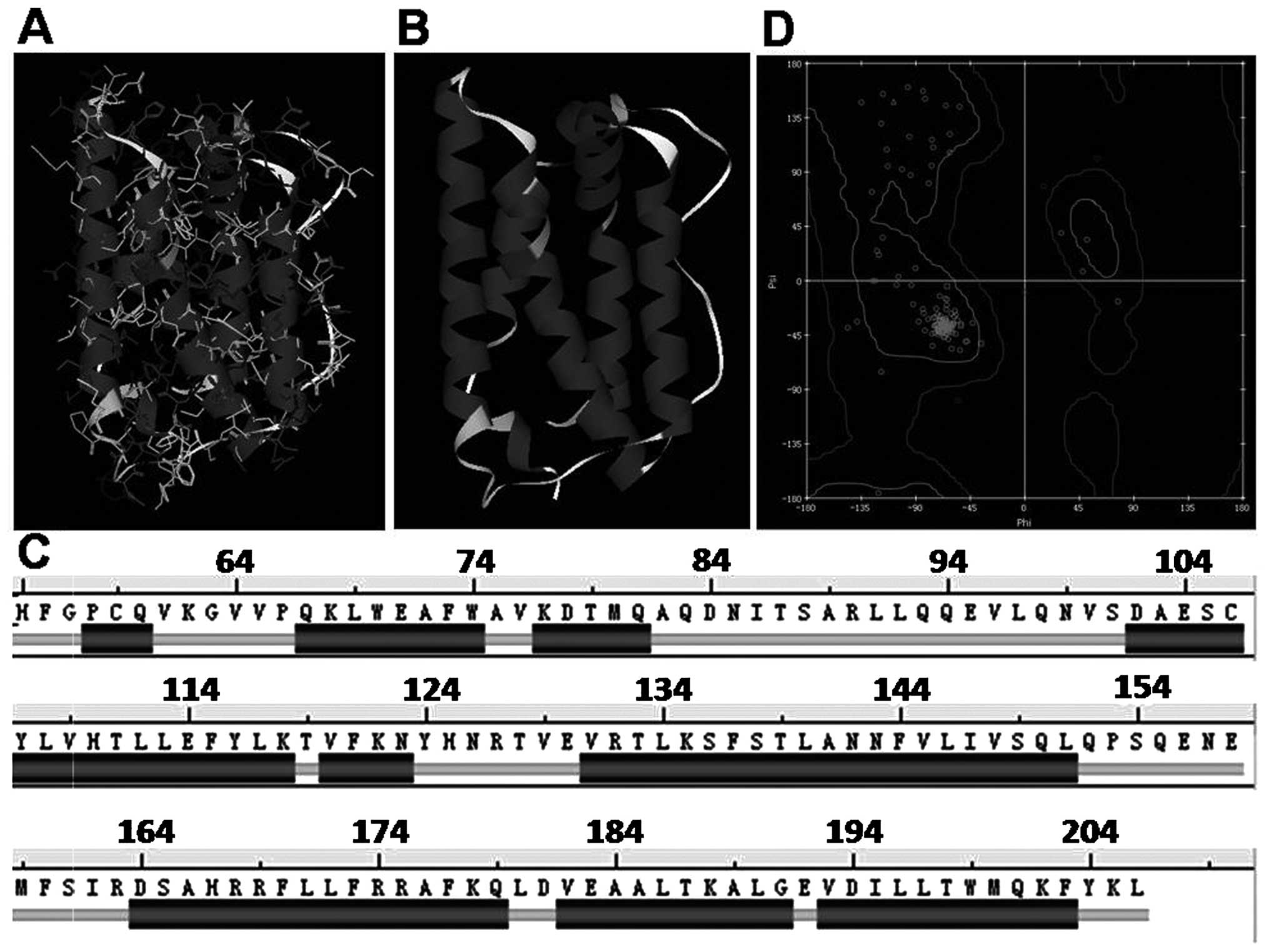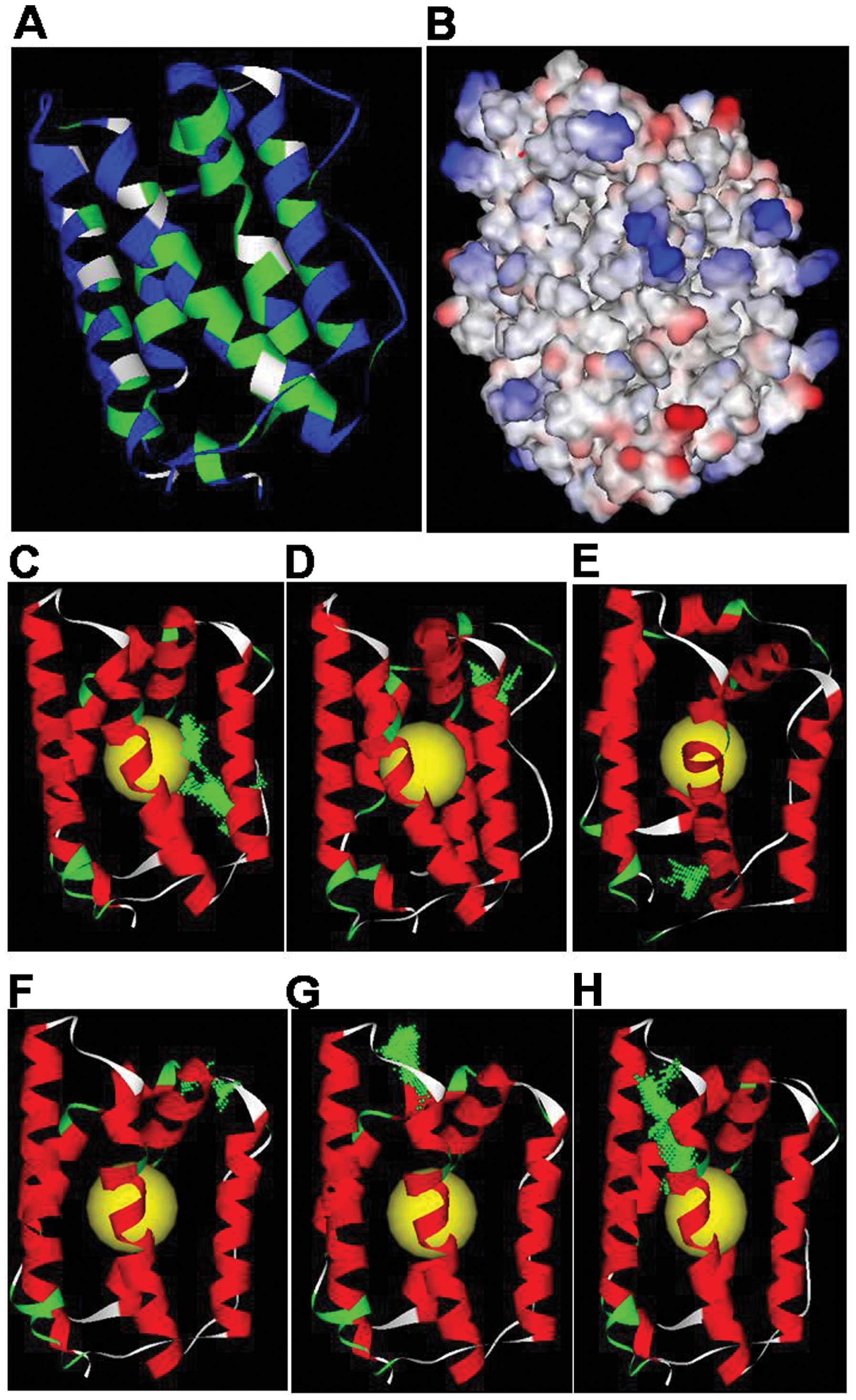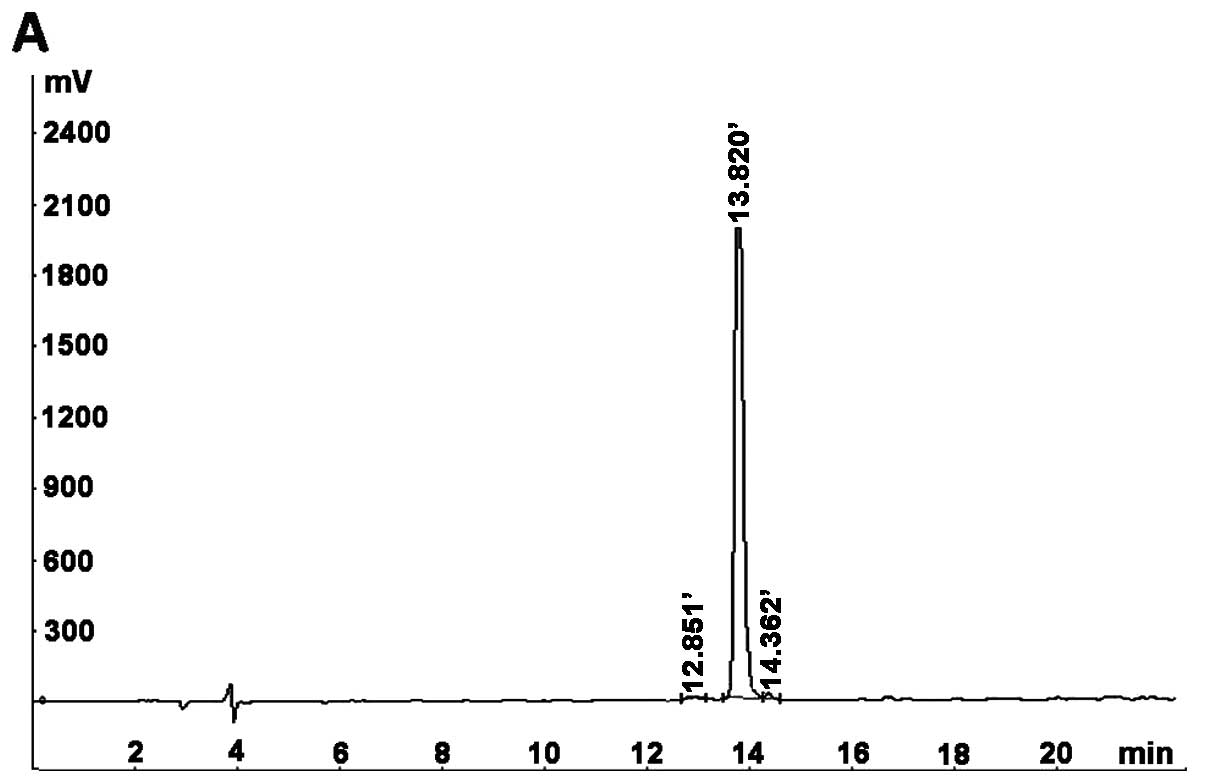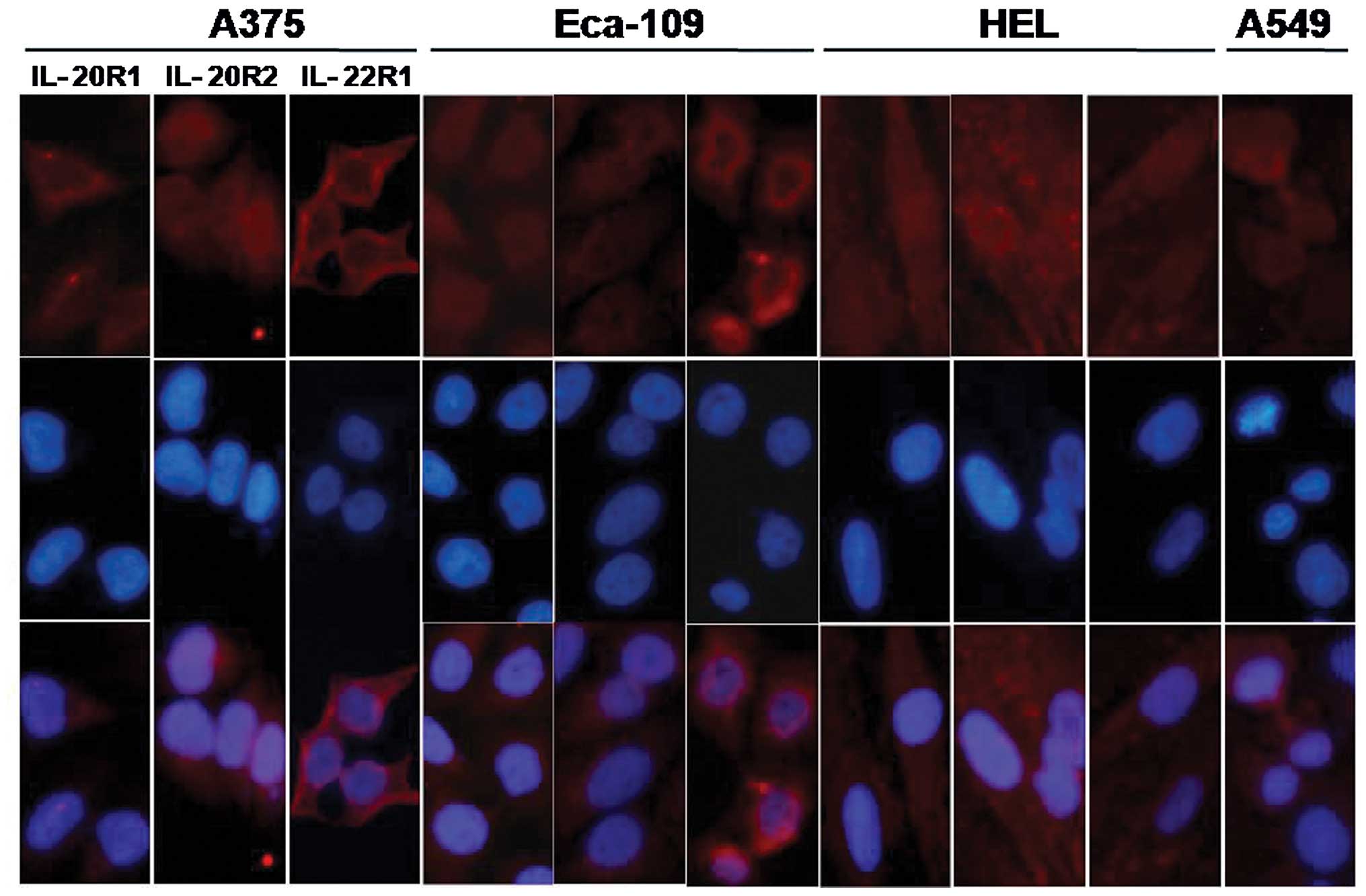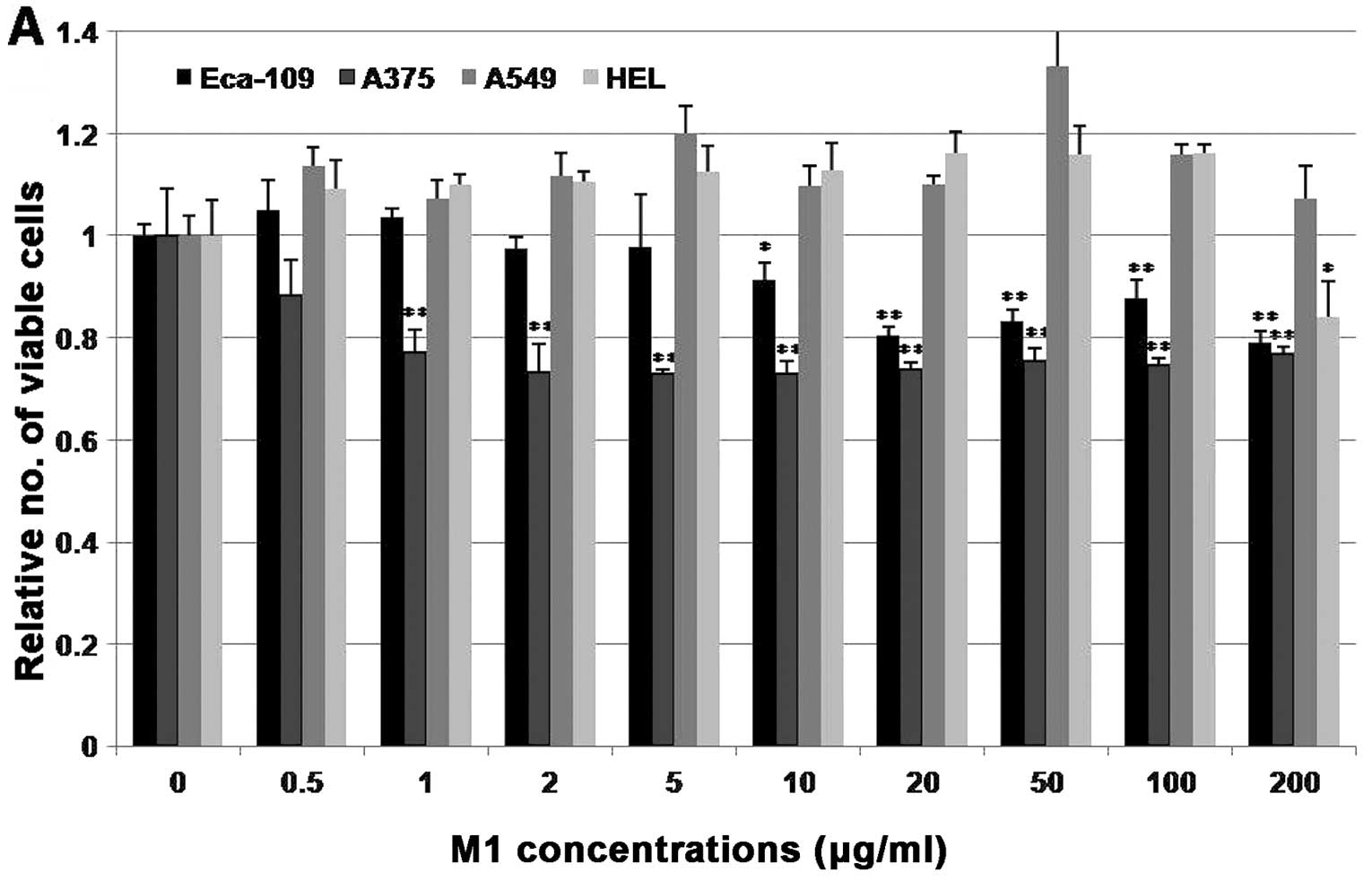|
1
|
Vogelstein B and Kinzler KW: Cancer genes
and the pathways they control. Nat Med. 10:789–799. 2004.
View Article : Google Scholar : PubMed/NCBI
|
|
2
|
Janet P, Whitney S, Fang X, et al:
Rational design of shepherdin, a novel anticancer agent. Cancer
Cell. 7:457–468. 2005. View Article : Google Scholar
|
|
3
|
Jiang H, Lin JJ, Su ZZ, et al: Subtraction
hybridization identifies a novel melanoma differentiation
associated gene, mda-7, modulated during human melanoma
differentiation, growth and progression. Oncogene. 11:2477–2286.
1995.PubMed/NCBI
|
|
4
|
Gupta P, Su ZZ, Lebedeva IV, et al:
mda-7/IL-24: multifunctional cancer-specific apoptosis-inducing
cytokine. Pharmacol Ther. 111:596–628. 2006. View Article : Google Scholar : PubMed/NCBI
|
|
5
|
Mhashilkar AM, Schrock RD, Hindi M, et al:
Melanoma differentiation associated gene-7 (mda-7): a novel
anti-tumor gene for cancer gene therapy. Mol Med. 7:271–282.
2001.PubMed/NCBI
|
|
6
|
Dent P, Yacoub A, Hamed HA, et al:
MDA-7/IL-24 as a cancer therapeutic: from bench to bedside.
Anticancer Drugs. 21:725–731. 2010. View Article : Google Scholar : PubMed/NCBI
|
|
7
|
Caudell EG, Mumm JB, Poindexter N, et al:
The protein product of the tumor suppressor gene, melanoma
differentiation-associated gene 7, exhibits immunostimulatory
activity and is designated IL-24. J Immunol. 168:6041–6046. 2002.
View Article : Google Scholar : PubMed/NCBI
|
|
8
|
Mumm JB, Ekmekcioglu S, Poindexter NJ, et
al: Soluble human MDA-7/IL-24: characterization of the molecular
form(s) inhibiting tumor growth and stimulating monocytes. J
Interferon Cytokine Res. 26:877–886. 2006. View Article : Google Scholar
|
|
9
|
Su ZZ, Lebedeva IV, Sarkar D, et al:
Melanoma differentiation associated gene-7, mda-7/IL-24,
selectively induces growth suppression, apoptosis and
radiosensitization in malignant gliomas in a p53-independent
manner. Oncogene. 22:1164–1180. 2003. View Article : Google Scholar : PubMed/NCBI
|
|
10
|
Su Z, Emdad L, Sauane M, et al: Unique
aspects of mda-7/IL-24 antitumor bystander activity: establishing a
role for secretion of MDA-7/IL-24 protein by normal cells.
Oncogene. 24:7552–7566. 2005. View Article : Google Scholar : PubMed/NCBI
|
|
11
|
Yacoub A, Liu R, Park MA, et al: Cisplatin
enhances protein kinase R-like endoplasmic reticulum kinase- and
CD95-dependent melanoma differentiation-associated
gene-7/interleukin-24-induced killing in ovarian carcinoma cells.
Mol Pharmacol. 77:298–310. 2010. View Article : Google Scholar :
|
|
12
|
Lebedeva IV, Washington I, Sarkar D, et
al: Strategy for reversing resistance to a single anticancer agent
in human prostate and pancreatic carcinomas. Proc Natl Acad Sci
USA. 104:3484–3489. 2007. View Article : Google Scholar : PubMed/NCBI
|
|
13
|
Bocangel D, Zheng M, Mhashilkar A, et al:
Combinatorial synergy induced by adenoviral-mediated mda-7 and
Herceptin in Her-2+ breast cancer cells. Cancer Gene
Ther. 13:958–968. 2006. View Article : Google Scholar : PubMed/NCBI
|
|
14
|
Su Z, Lebedeva IV, Gopalkrishnan RV, et
al: A combinatorial approach for selectively inducing programmed
cell death in human pancreatic cancer cells. Proc Natl Acad Sci
USA. 98:10332–10337. 2001. View Article : Google Scholar : PubMed/NCBI
|
|
15
|
Lebedeva IV, Su ZZ, Sarkar D, et al:
Melanoma differentiation associated gene-7, mda-7/interleukin-24,
induces apoptosis in prostate cancer cells by promoting
mitochondrial dysfunction and inducing reactive oxygen species.
Cancer Res. 63:8138–8144. 2003.PubMed/NCBI
|
|
16
|
Zerbini LF, Czibere A, Wang Y, et al: A
novel pathway involving melanoma differentiation associated
gene-7/interleukin-24 mediates nonsteroidal anti-inflammatory
drug-induced apoptosis and growth arrest of cancer cells. Cancer
Res. 66:11922–11931. 2006. View Article : Google Scholar : PubMed/NCBI
|
|
17
|
Chada S, Mhashilkar AM, Liu Y, et al:
mda-7 gene transfer sensitizes breast carcinoma cells to
chemotherapy, biologic therapies and radiotherapy: correlation with
expression of bcl-2 family members. Cancer Gene Ther. 13:490–502.
2006. View Article : Google Scholar
|
|
18
|
Zerbini LF, Tamura RE, Correa RG, et al:
Combinatorial effect of non-steroidal anti-inflammatory drugs and
NF-κB inhibitors in ovarian cancer therapy. PLoS One. 6:e242852011.
View Article : Google Scholar
|
|
19
|
Fisher PB: Is mda-7/IL-24 a ‘magic bullet’
for cancer? Cancer Res. 65:10128–10138. 2005. View Article : Google Scholar : PubMed/NCBI
|
|
20
|
Dong CY, Zhang F, Duan YJ, et al:
mda-7/IL-24 inhibits the proliferation of hematopoietic
malignancies in vitro and in vivo. Exp Hematol. 36:938–946. 2008.
View Article : Google Scholar : PubMed/NCBI
|
|
21
|
Saeki T, Mhashilkar A, Swanson X, et al:
Inhibition of human lung cancer growth following
adenovirus-mediated mda-7 gene expression in vivo. Oncogene.
21:4558–4566. 2002. View Article : Google Scholar : PubMed/NCBI
|
|
22
|
Tamai H, Miyake K, Yamaguchi H, et al:
AAV8 vector expressing IL24 efficiently suppresses tumor growth
mediated by specific mechanisms in MLL/AF4-positive ALL model mice.
Blood. 11:64–71. 2012. View Article : Google Scholar
|
|
23
|
Pataer A, Hu W, Xiaolin L, et al:
Adenoviral endoplasmic reticulum-targeted mda-7/interleukin-24
vector enhances human cancer cell killing. Mol Cancer Ther.
7:2528–2535. 2008. View Article : Google Scholar : PubMed/NCBI
|
|
24
|
Sauane M, Su ZZ, Gupta P, et al: Autocrine
regulation of mda-7/ IL-24 mediates cancer-specific apoptosis. Proc
Natl Acad Sci USA. 105:9763–9768. 2008. View Article : Google Scholar
|
|
25
|
Margue C and Kreis S: IL-24: physiological
and supraphysiological effects on normal and malignant cells. Curr
Med Chem. 17:3318–3326. 2010. View Article : Google Scholar : PubMed/NCBI
|
|
26
|
Dash R, Bhutia SK, Azab B, et al:
mda-7/IL-24: a unique member of the IL-10 gene family promoting
cancer-targeted toxicity. Cytokine Growth Factor Rev. 21:381–391.
2010. View Article : Google Scholar : PubMed/NCBI
|
|
27
|
Zheng M, Bocangel D, Ramesh R, et al:
Interleukin-24 overcomes temozolomide resistance and enhances cell
death by down-regulation of O6-methylguanine-DNA
methyltransferase in human melanoma cells. Mol Cancer Ther.
7:3842–3851. 2008. View Article : Google Scholar : PubMed/NCBI
|
|
28
|
Gupta P, Walter MR, Su ZZ, et al:
BiP/GRP78 is an intracellular target for MDA-7/IL-24 induction of
cancer-specific apoptosis. Cancer Res. 66:8182–8191. 2006.
View Article : Google Scholar : PubMed/NCBI
|
|
29
|
Gupta P, Emdad L, Lebedeva IV, et al:
Targeted combinatorial therapy of non-small cell lung carcinoma
using a GST-fusion protein of full-length or truncated MDA-7/IL-24
with Tarceva. J Cell Physiol. 215:827–836. 2008. View Article : Google Scholar : PubMed/NCBI
|
|
30
|
Rosal R, Brandt-Rauf P, Pincus MR, et al:
The role of alpha-helical structure in p53 peptides as a
determinant for their mechanism of cell death: necrosis versus
apoptosis. Adv Drug Deliv Rev. 57:653–660. 2005. View Article : Google Scholar : PubMed/NCBI
|
|
31
|
Böttger A, Böttger V, Sparks A, et al:
Design of a synthetic Mdm2-binding mini protein that activates the
p53 response in vivo. Curr Biol. 7:860–869. 1997. View Article : Google Scholar
|
|
32
|
Tong AW, Nemunaitis J, Su D, et al:
Intratumoral injection of INGN 241, a nonreplicating adenovector
expressing the melanoma-differentiation associated gene-7
(mda-7/IL24): biologic outcome in advanced cancer patients. Mol
Ther. 11:160–172. 2005. View Article : Google Scholar
|
|
33
|
Cunningham CC, Chada S, Merritt JA, et al:
Clinical and local biological effects of an intratumoral injection
of mda-7 (IL24; INGN 241) in patients with advanced carcinoma: a
phase I study. Mol Ther. 11:149–159. 2005. View Article : Google Scholar
|
|
34
|
Dent P, Yacoub A, Hamed HA, et al: The
development of MDA-7/ IL-24 as a cancer therapeutic. Pharmacol
Ther. 128:375–384. 2010. View Article : Google Scholar : PubMed/NCBI
|
|
35
|
Sauane M, Gopalkrishnan RV, Sarkar D, et
al: MDA-7/IL-24: novel cancer growth suppressing and apoptosis
inducing cytokine. Cytokine Growth Factor Rev. 14:35–51. 2003.
View Article : Google Scholar
|
|
36
|
Chada S, Sutton RB, Ekmekcioglu S, et al:
MDA-7/IL-24 is a unique cytokine - tumor suppressor in the IL-10
family. Int Immunopharmacol. 4:649–667. 2004. View Article : Google Scholar : PubMed/NCBI
|
|
37
|
Kotenko SV: The family of IL-10-related
cytokines and their receptors: related, but to what extent?
Cytokine Growth Factor Rev. 13:223–240. 2002. View Article : Google Scholar : PubMed/NCBI
|
|
38
|
Lebedeva IV, Emdad L, Su ZZ, et al:
mda-7/IL-24, novel anticancer cytokine: Focus on bystander
antitumor, radiosensitization and antiangiogenic properties and
overview of the phase I clinical experience (Review). Int J Oncol.
31:985–1007. 2007.PubMed/NCBI
|
|
39
|
Chada S, Mhashilkar AM, Ramesh R, et al:
Bystander activity of Ad-mda7: human MDA-7 protein kills melanoma
cells via an IL-20 receptor-dependent but STAT3-independent
mechanism. Mol Ther. 10:1085–1095. 2004. View Article : Google Scholar : PubMed/NCBI
|















